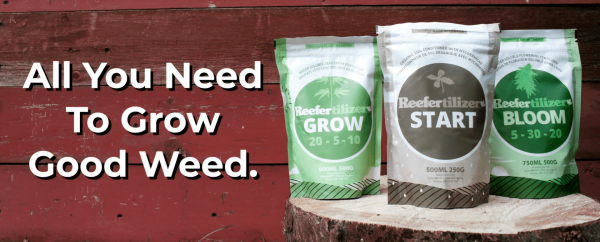When it comes to growing organic cannabis and using fertilizers one question often comes up:
can you mix organic and synthetic nutrients?
This topic has been hotly debated in the cannabis world and is controversial to say the least. The overuse of fertilizers in the industrial agriculture world gave synthetics a bad rap and with the rise of organic everything, many have been led to believe organic equals better.
The real answer lies somewhere in the middle and is more complicated than simply organic good, synthetic bad. Cannabis requires plenty of nutrition to produce high yields and your growing style and goals play a big part in your decision to use organic versus synthetic nutrients.
In this post we’ll go over the differences between the two and the advantages and disadvantages of both. And since there is no lack of misconceptions about organic and synthetic nutrients we’ll dispel the myths and answer the question of whether you can mix organic and synthetic nutrients when growing cannabis.
Terminology
In agriculture, the term “organic” refers to “living matter” but there can be a lot of confusion around what organic actually is and what it means on a package. Organic standards for food are big business and being certified as organic can be both costly and time consuming.
Seeing the word “organic” on a label means the product was made from organic living matter. Organic foods are grown without chemical fertilizers or pesticides.
When it comes to the scientific definition of “organic” it’s a little different. The term organic refers to the chemical definition meaning organic compounds are any chemical compounds that contain carbon-hydrogen or carbon-carbon bonds.
Common examples of this in synthetic fertilizer are chelated nutrients; an inorganic nutrient is encased by an organic molecule.
A synthetic fertilizer may contain organic molecules (ie. those with carbon) but it isn’t considered an “organic fertilizer” by organic farming standards.
By comparison, synthetic fertilizers are those that are man-made and inorganic. They do not contain as many micronutrients and do little to improve your soil’s fertility. They are highly water-soluble and are designed to be fast-acting nutrition for your plants.
What are Organic Fertilizers and how do they work?
Organic fertilizers are fertilizers that are derived from “natural” sources and are naturally produced. They range from fresh or dried plant material to animal manures and byproducts.
In this application, organic-ness is determined by the Principles of Organic Agriculture (aspirations for organic farming established by the International Federation of Organic Agriculture Movements in 2005) as opposed to whether the fertilizer contains organic compounds. These principles determine whether the fertilizer can be used for commercial organic agriculture.
Organic fertilizers are the products of natural decomposition made from natural sources that provide plants with slow-release nourishment. They feed the soil to create a sustainable ecosystem that relies on an army of tiny organisms (microbes) to facilitate the breakdown of organic material into nutrients available for your plants.
Growing organic cannabis using organic fertilizers means you are not only taking care of your plants, but also the soil and microorganisms in it. Since they rely on microorganisms or microbials in the soil they are considered slow release since it takes time for the microbials to break everything down.
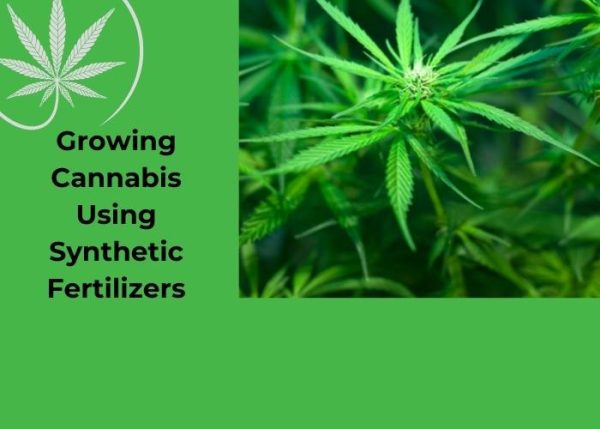
Microbials are like nature’s caretakers and these tiny organisms include protozoa, bacteria, fungi, and archaea. They help with everything from aeration to pest control and make up a huge part of the soil’s diversity. Organic fertilizers take advantage of this relationship by allowing the microbials to process the organic matter for the plant to feed on.
The cannabis plant will only take what it needs and many find that natural nutrients increase the aroma and flavor of your buds.
Many choose to grow organic cannabis because of the benefits of organic fertilizers. There is less chance of overfeeding or nutrient burn and it is a more sustainable form of growing. Less nutrient waste and runoff means your soil stays nourished for longer and you end up using (and losing) fewer nutrients. However, the slow-release nature means it takes more time for the nutrients to be absorbed and it can be harder to spot and fix deficiencies. Bugs and pests are more attracted to organic matter and the cost, application, and imprecise nutrient levels can be a turnoff for growers. Organic nutrient levels can vary depending on what you’re using and the level of nutrients can vary widely.
The term “organic” is often mistakenly synonymous with “better for the environment” or “safer”. While it’s true they do not runoff into waterways causing environmental damage as easily, they can still have an environmental impact, especially in liquid form. Liquid manure management, especially on commercial dairy farms, contributes to greenhouse gas emissions and the obvious environmental impacts. Different organic fertilizers can have different effects on the environment. For instance, organic fertilizers made from fish emulsions can contain higher levels of heavy metals, depending on the source.
Organic fertilizers won’t work with hydroponic systems since there’s little microbial life and they can clog sprayers and pumps. They do provide a rich mix of macro and micronutrients for your plants and there is a growing selection of products available with an analysis of their nutrients on the label.
What are Synthetic Fertilizers and how do they work?
Synthetic fertilizers are fertilizers that have undergone a manufacturing process to extract certain nutrients and combine them in specific ratios. Although they may come from natural sources, they undergo a process that refines the chemicals to their pure state, allowing them to be readily available to plants.
There are many different types available, from all purpose to quick and slow release, and will list the ratio of nutrients they contain as well as a list of elements found in the mixture and their percentage by weight. This is often expressed as an NPK ratio which are the chemical symbols for nitrogen (N), phosphorus(P), and potassium(K).
Synthetic fertilizers are synthesized in a laboratory using the Haber-Bosch process which converts nitrogen to ammonia by a reaction with hydrogen. Developed in the early 1900s by Fritz Haber and modified for mass production by Carl Bosch, this industrial process is a critical part of manufacturing plant fertilizers. This process is what allowed for the mass production of fertilizer by allowing mass production of ammonia, an essential component in the synthesizing of plant fertilizers.
Synthetic fertilizer blends combine nitrogen, phosphate, and potassium into specific and exact mixes in a form that is readily available to plants. Unlike organic fertilizers that rely on soil bacteria and fungi to convert them into a form the plant can use, man-made cannabis nutrients like synthetic fertilizers are instantly available for uptake by the plant.
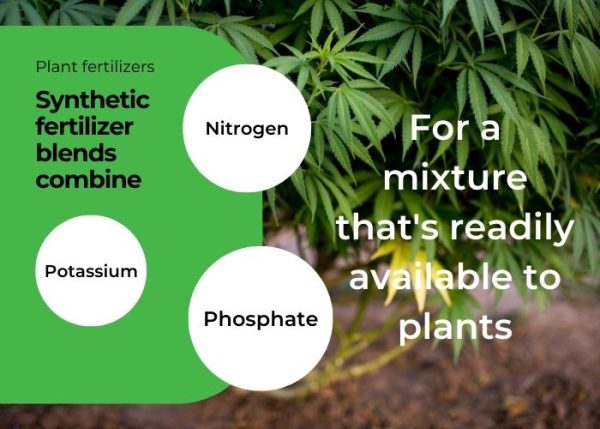
Trace nutrients and micronutrients are also needed for plant growth; however, many are unavailable to plants in their basic form. Due to a difference in positive or negative ion charge, these elements can’t enter the plant and therefore are lost. By surrounding these ions with a chelate, it changes the charge and allows the element to be transferred to the plants. Chelates are larger molecules that surround the micronutrient ion to form a chelated micronutrient. Chelated micronutrients are less reactive to soil conditions and therefore can enhance nutrient uptake and improve fertilizer efficiency.
Although there are many advantages to synthetic fertilizers or synthetic cannabis nutrients, they are not without their issues too. Man-made cannabis nutrients are prime for “user error” and application instructions should always be closely followed. Since nutrients are released quickly and available for absorption, it can affect plant growth negatively and may harm your plants roots if applied too heavily. Less is more. They may nourish plants in the short term, but may also reduce the health of your soil overall when used incorrectly. Synthetic fertilizers don’t nourish or feed the microorganisms as well as organic fertilizers do and may even repel beneficial organisms like earthworms.
Synthetic fertilizers, especially in large scale agricultural applications have gotten a bad rap due to over-fertilization of the soil and the dangers of agricultural runoff. But these fertilizers, when used correctly, have the ability to quickly address nutritional deficiencies and increase crop yields.
Do synthetic fertilizers kill microbes in soil?
The nutrients found in synthetic fertilizers are released as soon as they are dissolved in water. Many people believe that this quick release of nutrients kills microbes in the soil and impacts the microbial life of the soil negatively.
And while it’s true that organic treatments can increase both fungi and bacteria (although only slightly), countless research has been performed on the number of bacteria in soil after applying both man-made and organic fertilizers.
The science is clear that when synthetic fertilizers are used properly, they do not kill microbes in soil.
Can you combine organic and synthetic fertilizer?
Now that we’ve gone over the differences between organic and synthetic fertilizer, and the strengths and weaknesses of each, we can answer the burning question: can you mix organic and synthetic nutrients?
The answer is yes, but there are considerations to take into account, like what your plants need and the growing medium you’re using.
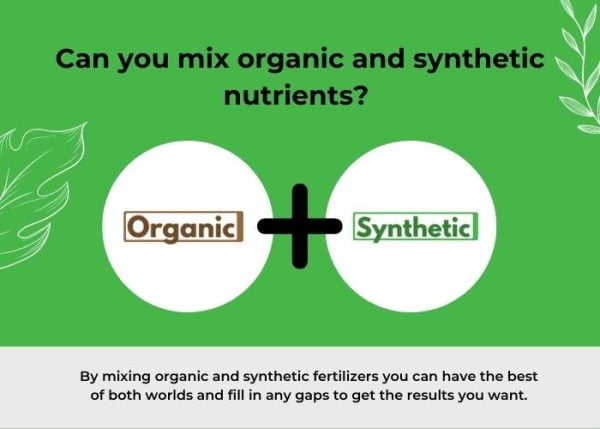
Plants need different nutrients in different ratios during certain phases of growth.
For instance, during the blooming cycle they need more phosphorus than they would need during the vegetative phase. By mixing organic and synthetic fertilizers you can have the best of both worlds and fill in any gaps to get the results you want. Synthetic fertilizers can complement organic fertilizers when used in the right amounts and at the right time.
Plants can’t tell the difference between organic and synthetic nutrients, they will take what they need regardless of how it was manufactured or where it came from. But it’s important for you to know the difference so you are giving your plants what they need. Always read the label and look for the ratio of nitrogen, phosphorus, and potassium. This is often listed as the NPK ratio, although it may not expressly say that. The numbers listed for the NPK ratio show the percentage of total weight of that element. If you see N 30 this would mean that 30% of the weight of that package is Nitrogen. NPK numbers for synthetic fertilizers are often higher due to their concentrated nature. A general rule is that powders are usually synthetic while liquids are organic, but this doesn’t always hold true.
Organic anything is big business and getting a product certified organic can be a time consuming and expensive process. Companies that have gone through this process are keen to use this to their advantage and usually make it obvious on the product. Organic fertilizers usually specify what percentage of nutrients are organic and they generally have lower NPK values than synthetic fertilizers.
What fertilizer or combination of nutrients you use will depend on your overall goals and grow set-up. A great way to get the best of both worlds is by combining organic and synthetic fertilizers. Synthetic fertilizers or man-made cannabis nutrients are an efficient way to feed your plants many of the major and minor elements they need. Organic fertilizers can be useful to help build your soil and introduce beneficial bacteria and other microbes that work to make the nutrients in your soil available to your plants.
Ultimately the availability of nutrients in your soil is dependent upon the pH, or acidity or alkalinity of your soil. This can be easily tested with a pH meter but you’ll also want to test other elements of the soil. A TDS or an EC meter can help you keep an eye on how “hot” the nutrient solution is and let you adjust accordingly. This is especially important for growing organic cannabis and building a healthy soil balance.
Soil management
If you’re hoping to grow organic cannabis the health of your plants depends on the health of your soil. But soil management can be time consuming to perfect and comes at both a financial and space cost. The key to better weed is keeping your soil in a healthy balance of pH, nutrients, and moisture.
Plants don’t care where the nutrients come from so you can take a hybrid approach to growing organic cannabis and using man-made cannabis nutrients. Grow with organic soil and keep it happy with a top dressing like Reefertilizer Start, while using Grow and Bloom synthetic fertilizers to fill in any gaps. Building a better soil provides your plant’s roots a better environment to metabolize nutrients and water. The organic nutrients will slowly breakdown while beneficial microbials use enzymes to break down organics into compounds the roots can absorb, resulting in faster growth. The mycorrhizal fungus spores grow around the roots when they come in contact with them to inoculate the root system. Organic soils and their needs will change and grow over time, but thanks to the natural growing environment you won’t need to feed your plants as many additional fertilizers.

Conclusion
Finding the right fertilizer for your cannabis plants comes down to what your growing goals are and the time and space you have to work with. It may not be sustainable to go 100% organic but that doesn’t mean you can’t incorporate organic growing elements.
Using synthetic fertilizers to fill in nutritional gaps is a great way to get the best of both worlds.
Synthetics help address nutrient deficiencies quickly and if used correctly (always follow the instructions!) won’t harm the microbial life of the soil.
Using a combination of both organic and synthetic nutrients can be a win-win situation for you and your plants. Synthetic fertilizers with both micro and macro nutrients, like Reefertilizer, can remedy many nutrient deficiencies quickly while adding an organic monthly top dressing to feed your soil and support your plant’s roots for proper soil management.
If you want to learn even more about growing good cannabis, we offer a free 40+ page guide full of images.
Now available on Amazon.
Sign up for our newsletter and download the digital copy today!
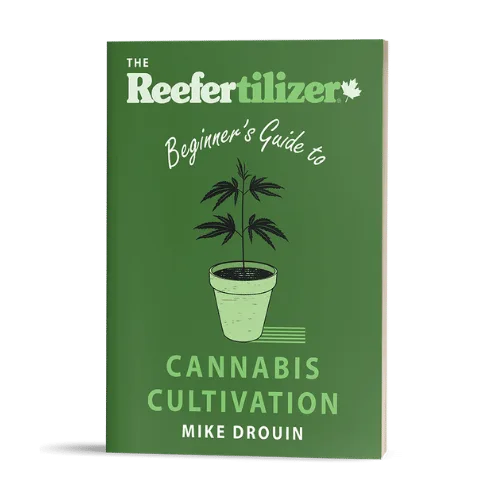
This guide will answer many questions about growing cannabis, like the following...
Selecting Seeds
Identify and Correct Problems
Maximize Yield
Much More...
Get a Chance to INSTANTLY WIN a Reefertilizer Nutrient Kit When You Sign Up.
Kelly is a content writer who has a passion for research and writes about a variety of topics including cannabis, women’s health, and birding. Professionally trained as a teacher, she left the classroom behind to spend more time writing well-researched blog posts and articles, and less time writing report cards.
When she’s not writing, Kelly loves being outdoors as much as possible whether that’s running, hiking, or riding her motorcycle. Read more about her work at her website www.kellyberrycopy.com or connect with her on LinkedIn at www.linkedin.com/in/kellygberry.

